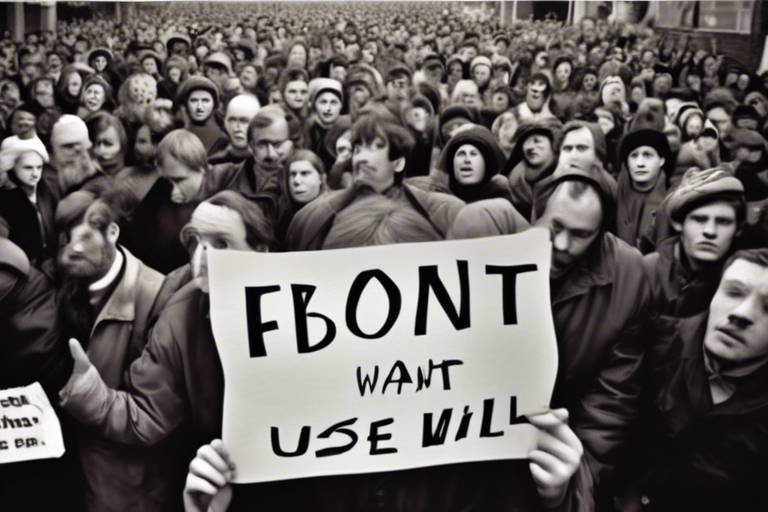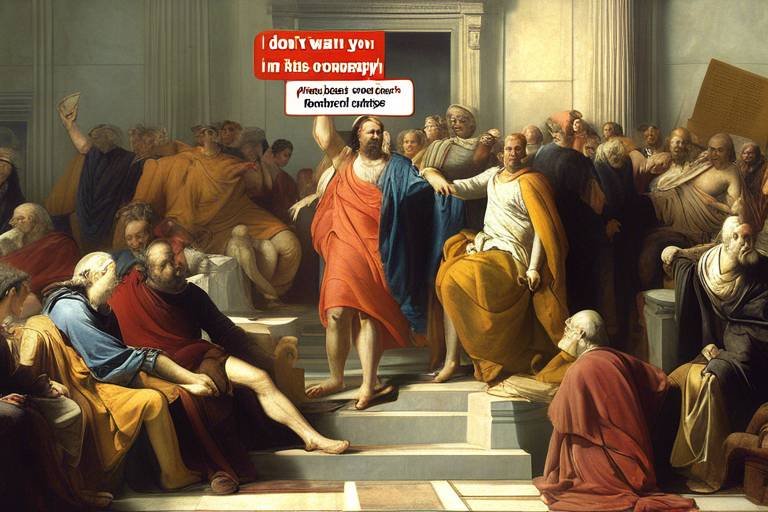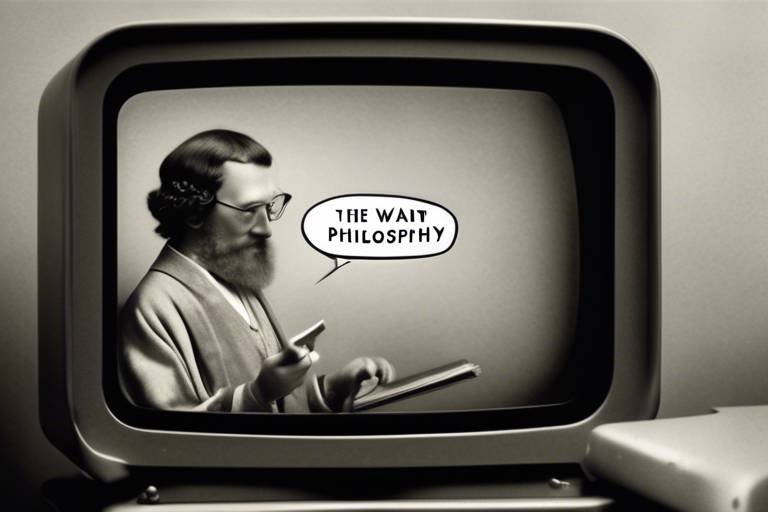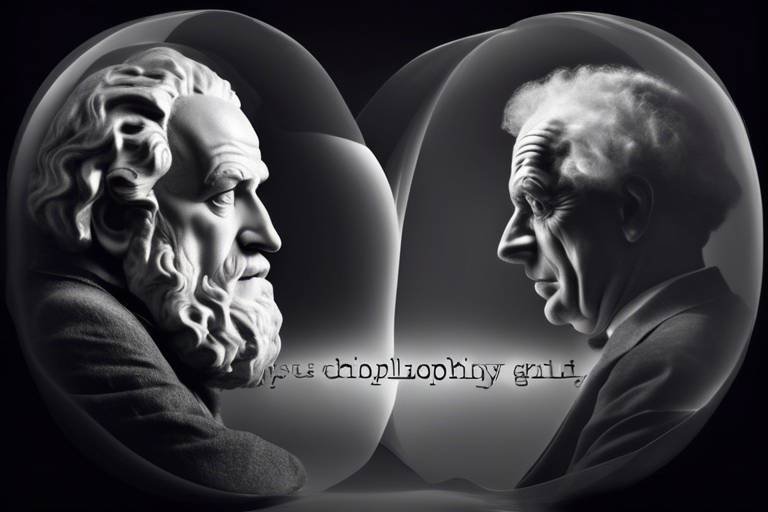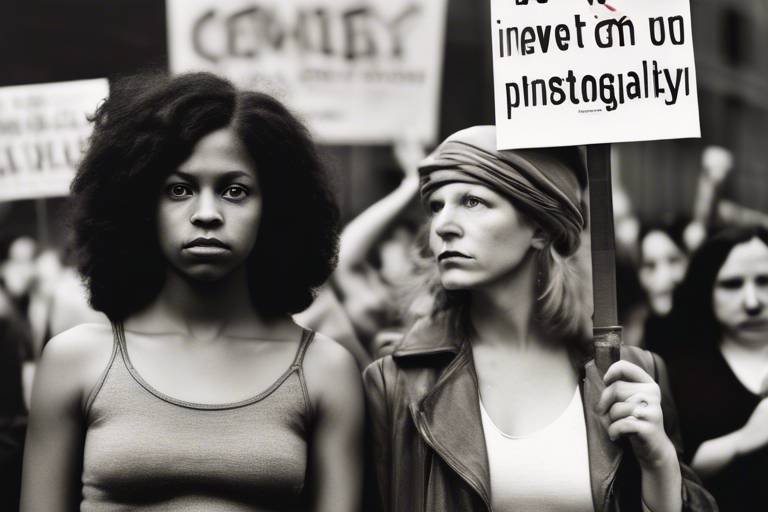Reality Vs Perception - Uncovering the Philosophical Truth
In a world bursting with stimuli, the interplay between reality and perception shapes our understanding of existence in profound ways. Have you ever wondered why two people can witness the same event and walk away with completely different interpretations? This phenomenon raises intriguing questions about how we perceive the world around us. Are we merely passive observers, or do our minds actively construct the reality we experience? This article dives deep into the intricate relationship between reality and perception, examining philosophical perspectives, psychological implications, and the far-reaching impact on human understanding.
When we think about reality, we often assume it is an objective truth that exists independently of our minds. However, various philosophical theories challenge this notion. For instance, realism posits that reality is what it is, regardless of our perceptions. In contrast, idealism suggests that reality is fundamentally shaped by our consciousness. Think of it this way: if reality were a canvas, our perceptions would be the brushstrokes that define the final masterpiece. The nature of reality is not just about what is 'out there'; it’s also about how we interpret and understand that reality through our consciousness.
Perception plays a pivotal role in shaping our interpretation of reality. It is not merely a passive reception of sensory information; it involves complex psychological processes that filter and interpret that information. For example, consider how our emotions can color our perceptions. When we're happy, the world seems bright and full of opportunities, whereas sadness can cast everything in a gloomy light. This subjective nature of perception means that our experiences are unique to us, influenced by factors such as culture, personal history, and even our current mood.
Throughout history, philosophers have grappled with the concepts of reality and perception. Different thinkers have offered diverse viewpoints that enrich our understanding of these complex ideas. For example, Immanuel Kant argued that our understanding of reality is shaped by the filters of our senses and cognition. He believed that while there is a 'thing-in-itself'—the objective reality—our perception of it is always mediated by our mental frameworks. This leads us to question: can we ever truly know reality as it is, or are we forever confined to our subjective interpretations?
The debate between realism and idealism is central to the discussion of reality and perception. Realists assert that the world exists independently of our thoughts, while idealists believe that reality is constructed by our perceptions and thoughts. This clash of ideas can be likened to the difference between a photograph and a painting. A photograph captures reality as it is, whereas a painting reflects the artist's interpretation, influenced by emotion and perspective. Understanding these philosophies helps us navigate our own perceptions and recognize the biases that shape them.
Another significant philosophical approach is phenomenology, which focuses on how lived experiences shape our perception and understanding of reality. It emphasizes the importance of subjective experience, suggesting that our interactions with the world are filtered through our consciousness. Imagine walking through a forest; the vibrant colors, the sound of rustling leaves, and the scent of pine all contribute to your unique experience. This subjective lens is what phenomenology seeks to explore, highlighting that each person's reality is a tapestry woven from their experiences.
The psychological effects of perception extend far beyond mere interpretation; they influence our behavior, decisions, and interactions with others. Cognitive biases, such as confirmation bias, can lead us to interpret information in a way that aligns with our pre-existing beliefs, distorting our understanding of reality. Additionally, cultural factors play a significant role in shaping our perceptions. For instance, different cultures may interpret gestures or expressions differently, leading to misunderstandings. Recognizing these biases is essential for fostering better communication and understanding among diverse groups.
In our daily lives, perception profoundly affects how we make decisions, interact with others, and navigate societal norms. For example, consider how advertisements often play on our perceptions to influence our purchasing choices. A brand might position itself as luxurious and exclusive, shaping our desire for its products based on perceived value rather than objective quality. This manipulation of perception can lead to a disconnect between what we believe we need and what is genuinely beneficial for us.
To illustrate the divergence between perception and objective reality, let’s look at a few case studies. One notable example is the impact of media on public perception. News outlets often frame stories in ways that can skew public understanding. For instance, sensationalized coverage of crime can lead to a perception that crime rates are rising, even when statistics show they are falling. Similarly, social interactions can be influenced by our perceptions, leading to misunderstandings and conflicts based on assumptions rather than facts.
To bridge the gap between reality and subjective experience, it’s crucial to enhance our awareness of our perceptions. Here are a few strategies that can help:
- Practice mindfulness: Being present in the moment can help you recognize your thoughts and feelings without judgment.
- Engage in critical thinking: Question your assumptions and consider alternative perspectives to broaden your understanding.
- Seek feedback: Discuss your perceptions with others to gain insights into how they may differ.
By employing these strategies, we can cultivate a more nuanced understanding of reality and improve our interactions with the world around us.
- What is the difference between reality and perception?
Reality refers to the objective state of things, while perception is how we interpret and understand those things based on our senses and experiences. - Can perception be trusted?
While perception is a valuable tool for navigating the world, it can be influenced by biases and emotions, making it essential to question and reflect on our interpretations. - How do cultural factors influence perception?
Cultural norms and values shape how we interpret behaviors, gestures, and information, leading to variations in perception across different societies.

The Nature of Reality
When we dive into the concept of reality, we find ourselves navigating a complex landscape filled with various philosophical theories and ideas. What exactly constitutes reality? Is it a tangible, objective world that exists independently of our thoughts and perceptions, or is it a subjective construct shaped by our consciousness? These questions have puzzled thinkers for centuries, leading to a rich tapestry of philosophical discourse.
At the heart of this exploration is the distinction between realism and idealism. Realism posits that reality exists outside of our perceptions and is independent of our thoughts. In contrast, idealism suggests that reality is fundamentally shaped by our perceptions and mental constructs. Imagine a canvas: realism would argue that the painting exists in its entirety regardless of whether anyone views it, while idealism would assert that the colors and shapes only come to life in the observer's mind. This ongoing debate is not just academic; it influences our understanding of everything from science to art, and even our personal experiences.
Another critical player in this philosophical game is consciousness. Our awareness and understanding of reality are deeply intertwined with our conscious experiences. Think about it: when you touch something hot, your immediate reaction is a sensory experience that informs your understanding of the world around you. This experience shapes your reality, highlighting the role of consciousness in interpreting the external world. In essence, reality is not just what is out there; it's also what we make of it through our perceptions and experiences.
To further illustrate this intricate relationship, let’s consider a few key philosophical perspectives:
- Realism: The belief that reality is objective and can be understood through observation and reason.
- Idealism: The view that reality is mentally constructed and that our perceptions shape what we consider real.
- Phenomenology: A philosophical approach that emphasizes the study of conscious experiences as a means to understand reality.
These perspectives not only help us understand the philosophical underpinnings of reality but also highlight the subjective nature of our experiences. For instance, phenomenology, founded by thinkers like Edmund Husserl, emphasizes that our lived experiences are crucial in shaping our understanding of reality. Instead of viewing reality as a fixed entity, phenomenology invites us to consider how our perceptions and experiences color our understanding of the world. It’s like looking through a tinted lens; the world may be the same, but how we perceive it can vary dramatically.
In conclusion, the nature of reality is a multifaceted concept that invites us to question our assumptions and delve deeper into the interplay between perception and understanding. As we navigate this philosophical landscape, we begin to see that reality is not merely a static entity but a dynamic interplay of experiences, consciousness, and interpretations. This realization not only enriches our understanding of the world but also encourages us to engage more thoughtfully with our perceptions and the realities they create.

The Role of Perception
Perception is like the lens through which we view the world; it shapes our understanding and influences our reactions to everything around us. Have you ever noticed how two people can witness the same event yet come away with completely different interpretations? This phenomenon underscores the profound impact of perception on our reality. Our brains are not mere recorders of information; they are active processors that filter, interpret, and sometimes distort the data we receive from our senses. This intricate dance between perception and reality is what makes human experience so rich and complex.
To understand the role of perception, we must first recognize that it is influenced by a multitude of factors, including our background, culture, emotions, and even our physical state. For instance, someone who has had a negative experience with a dog may perceive all dogs as threats, while another person who grew up with dogs may see them as friendly companions. This subjectivity in perception leads to a vast array of interpretations of the same reality, which can often create misunderstandings and conflicts in our interactions.
Moreover, perception is not just a passive reception of stimuli; it involves active engagement from our brains. Cognitive processes such as attention, memory, and expectation play critical roles in shaping how we perceive our surroundings. For example, cognitive biases can lead us to see what we want to see, reinforcing our existing beliefs and sometimes blinding us to alternative perspectives. This is particularly evident in social media, where algorithms curate content that aligns with our interests, further narrowing our perception of reality.
In addition, the interplay between perception and emotion cannot be overstated. Our feelings can color our perceptions, often leading us to interpret situations in ways that align with our emotional states. For instance, when we are feeling anxious, we may perceive neutral situations as threatening, while in a happy mood, the same situations may seem benign or even enjoyable. This emotional lens can significantly influence our decision-making processes and interpersonal relationships.
Ultimately, understanding the role of perception is essential for fostering better communication and empathy in our daily lives. Recognizing that everyone has their own unique lens can help us approach conflicts with more compassion and understanding. By embracing the diversity of perceptions, we can begin to bridge the gaps that often separate us, creating a more harmonious society.
In summary, perception is a powerful force that shapes our understanding of reality. It is influenced by a myriad of factors, including our experiences, emotions, and cognitive biases. By being aware of how perception operates, we can enhance our interactions and foster a deeper understanding of ourselves and others.
- What is the difference between reality and perception? Reality is the objective state of things, while perception is the subjective interpretation of those things.
- How can I improve my perception? Practicing mindfulness and critical thinking can help enhance awareness of your perceptions.
- Why do people perceive things differently? Individual experiences, cultural backgrounds, and emotional states contribute to variations in perception.

Philosophical Perspectives
When we dive into the ocean of regarding reality and perception, we encounter a vibrant tapestry woven by the thoughts of many brilliant minds. These perspectives shape our understanding and challenge our assumptions about what is real. At the heart of this exploration lies the age-old debate between realism and idealism, two contrasting philosophies that provide different lenses through which we can view the world.
Realism, in its essence, posits that reality exists independent of our perceptions. Think of it as a sturdy tree standing tall in a forest; whether or not we see it, the tree remains. This philosophy suggests that our senses can provide us with an accurate representation of the world. Philosophers like Aristotle and David Hume have championed this viewpoint, arguing that knowledge comes from our experiences and observations of the external world. They believed that by using reason and empirical evidence, we can uncover the truths of reality.
On the flip side, we have idealism, which suggests that reality is fundamentally shaped by our perceptions and mental constructs. Imagine a painter creating a masterpiece; the canvas is blank until the artist brings it to life with colors and shapes. In this sense, idealists like Immanuel Kant and George Berkeley argue that our understanding of reality is filtered through our consciousness, making it inherently subjective. They contend that the world we perceive is not a direct reflection of an external reality but rather a construct of our minds.
Another fascinating perspective comes from phenomenology, a philosophical movement that emphasizes the importance of lived experiences. Think of it as diving into a pool of personal experiences where each splash reveals something unique about how we perceive reality. Philosophers like Edmund Husserl and Martin Heidegger explored how our individual experiences shape our understanding of the world around us. They argued that to truly grasp reality, we must pay attention to our subjective experiences, as they form the basis of our knowledge and understanding.
These philosophical perspectives not only provide insight into the nature of reality and perception but also raise critical questions about our understanding of truth. Are we merely passive observers of an objective world, or are we active participants in creating our realities? This inquiry leads us to consider how our beliefs, emotions, and cultural backgrounds influence our perceptions. It’s a reminder that our grasp of reality is not just a straightforward reflection but a complex interplay of external stimuli and internal interpretations.
To further illustrate these philosophical perspectives, consider the following table that summarizes key differences between realism and idealism:
| Aspect | Realism | Idealism |
|---|---|---|
| Nature of Reality | Independent of perception | Dependent on perception |
| Key Thinkers | Aristotle, Hume | Kant, Berkeley |
| Knowledge Acquisition | Empirical observation | Mental constructs |
| Example | A tree exists whether we see it or not | The tree's existence is shaped by our perception of it |
In conclusion, the philosophical perspectives on reality and perception invite us to question our understanding of the world. They challenge us to explore the intricate relationship between what we perceive and what truly exists. As we navigate this complex landscape, we remain reminded that our perceptions are not mere reflections but rather vibrant interpretations of the world around us. So, the next time you ponder the nature of reality, remember the philosophers who have paved the way for us to think deeply about our existence.
- What is the difference between realism and idealism?
Realism asserts that reality exists independently of our perceptions, while idealism posits that reality is shaped by our perceptions and mental constructs. - Who are some key philosophers associated with these perspectives?
Key philosophers of realism include Aristotle and David Hume, while idealism is associated with thinkers like Immanuel Kant and George Berkeley. - What is phenomenology?
Phemenology is a philosophical approach that emphasizes the significance of lived experiences in shaping our understanding of reality.

Realism vs. Idealism
When diving into the ocean of philosophical thought, the debate between realism and idealism stands out like a lighthouse guiding us through the fog of understanding. At its core, realism posits that reality exists independently of our perceptions; it's as if the world is a stage set, complete with props and actors, regardless of whether anyone is watching. This perspective suggests that there are objective truths out there, waiting to be discovered, much like hidden treasures buried beneath the sands of time.
On the flip side, idealism argues that our perceptions shape the very fabric of reality. Imagine reality as a canvas, and our experiences and thoughts are the brushstrokes that create the masterpiece. Idealists believe that what we perceive is not just a reflection of an external world but an integral part of how we construct our understanding of existence. This philosophy raises intriguing questions: Are we merely observers of reality, or are we active participants in its creation?
To illustrate the contrast between these two philosophies, let's consider a table that outlines their fundamental differences:
| Aspect | Realism | Idealism |
|---|---|---|
| Nature of Reality | Independent of perception | Dependent on perception |
| Truth | Objective and discoverable | Subjective and constructed |
| Role of Mind | Passive observer | Active creator |
| Examples | Physical sciences | Art, literature |
As we navigate through these philosophical waters, it becomes clear that neither realism nor idealism holds a monopoly on truth. Instead, they offer complementary insights that can enrich our understanding. For instance, while realism might provide a solid foundation for scientific inquiry, idealism can enhance our appreciation for the subjective experiences that color our lives. It's like having two lenses through which to view the world—each revealing different facets of the same intricate diamond.
Furthermore, the implications of this debate extend beyond academic discourse. In our everyday lives, the tension between realism and idealism can influence how we approach relationships, decision-making, and even our personal goals. Are we striving to achieve something that exists objectively, or are we crafting our reality based on our ideals and aspirations? This interplay can lead to fascinating discussions and even conflicts, as people navigate their paths through the complexities of existence.
Ultimately, the dialogue between realism and idealism invites us to reflect on our own perceptions and beliefs. By engaging with these philosophical perspectives, we can cultivate a deeper understanding of ourselves and the world around us. So, the next time you find yourself pondering the nature of reality, remember that both realism and idealism offer valuable insights that can illuminate your journey.

Phenomenology
Phemenology is a fascinating philosophical approach that delves into the essence of human experience. It seeks to understand how we perceive reality through our lived experiences, emphasizing that our understanding is shaped not just by external stimuli but also by our internal consciousness. Imagine standing on a beach, feeling the sand between your toes and listening to the waves crashing against the shore. This moment is not just a sensory experience; it is a rich tapestry woven from your memories, emotions, and thoughts. Phenomenology invites us to explore this depth of experience, urging us to consider how our perceptions influence our understanding of the world.
At its core, phenomenology posits that reality is not a fixed entity waiting to be discovered; rather, it is a dynamic interplay between the observer and the observed. This perspective is championed by philosophers like Edmund Husserl and Maurice Merleau-Ponty, who argue that to grasp the true nature of reality, we must first examine our subjective experiences. They encourage us to set aside our preconceived notions and biases, allowing us to engage with the world as it is presented to us. This process of "bracketing" helps strip away layers of interpretation, revealing the pure essence of our experiences.
Consider the example of tasting a dish for the first time. Your perception of its flavor is influenced by various factors: your previous experiences with similar foods, your mood at that moment, and even the ambiance of the restaurant. Each of these elements contributes to your overall experience, showcasing how perception is a complex interplay of personal and contextual factors. Phenomenology emphasizes that understanding this interplay is crucial for grasping the nature of reality.
Furthermore, phenomenology highlights the importance of empathy in understanding others' experiences. When we engage with someone else's perspective, we are not merely observing their reality; we are entering their world. This empathetic engagement allows us to appreciate the richness of their experiences, fostering deeper connections and a more nuanced understanding of human behavior. In a world that often feels fragmented and polarized, phenomenology offers a pathway toward greater compassion and understanding.
In summary, phenomenology challenges us to reconsider our approach to reality. By focusing on our lived experiences and the subjective nature of perception, we can uncover deeper truths about ourselves and the world around us. This philosophical lens not only enriches our understanding of reality but also enhances our interpersonal relationships, urging us to connect with others on a more profound level.
- What is phenomenology? Phenomenology is a philosophical approach that studies the structures of experience and consciousness, focusing on how individuals perceive and interpret their lived experiences.
- Who are the key figures in phenomenology? Key figures include Edmund Husserl, who founded the movement, and Maurice Merleau-Ponty, who emphasized the embodied nature of perception.
- How does phenomenology differ from realism? While realism asserts that reality exists independently of our perceptions, phenomenology posits that our understanding of reality is shaped by our subjective experiences.
- Can phenomenology be applied in everyday life? Yes, phenomenology encourages mindfulness and empathy, which can enhance our understanding of ourselves and our relationships with others.

Psychological Implications
When we dive into the realm of , we uncover a fascinating tapestry of how our perceptions shape our actions and decisions. Have you ever wondered why two people can witness the same event and come away with entirely different interpretations? This phenomenon is not just a quirky aspect of human nature; it’s a profound reflection of how our minds work. Our perceptions are colored by a myriad of factors, including our past experiences, cultural backgrounds, and even our emotions at the moment.
One of the most intriguing aspects of perception is the concept of cognitive biases. These are systematic patterns of deviation from norm or rationality in judgment. They can lead us to see the world not as it is, but as we expect it to be. For instance, consider the confirmation bias, where individuals tend to favor information that confirms their existing beliefs. This can create a skewed understanding of reality, leading to a cycle of misinformation and misunderstanding. Imagine a person who believes that a certain political party is always right; they may only seek out news that supports this belief, ignoring any evidence to the contrary.
Moreover, our perceptions can be influenced by illusions. These aren’t just visual tricks; they extend into the cognitive realm. The famous Gambler’s Fallacy exemplifies this. A person might believe that after a series of losses in a game, a win is 'due.' This misinterpretation of probability can lead to significant emotional and financial consequences. It’s a stark reminder that our understanding of reality can be heavily distorted by psychological factors.
Culture also plays a massive role in shaping our perceptions. What is considered normal or acceptable in one culture might be viewed entirely differently in another. For example, the concept of personal space varies widely across cultures. In some societies, close physical proximity is a sign of warmth and friendliness, while in others, it may be perceived as intrusive. This cultural lens can create misunderstandings and conflict, as individuals navigate their interactions based on their perceived realities.
To illustrate these points further, let’s consider a table that summarizes some common cognitive biases and their implications:
| Cognitive Bias | Description | Implication |
|---|---|---|
| Confirmation Bias | Tendency to search for, interpret, and remember information that confirms one’s preconceptions. | Can lead to polarized views and resistance to change. |
| Anchoring Bias | Relying too heavily on the first piece of information encountered. | May skew decision-making processes. |
| Hindsight Bias | Seeing events as having been predictable after they have already occurred. | Can lead to overconfidence in one’s predictive abilities. |
In conclusion, the psychological implications of perception are vast and complex. They influence not just our understanding of reality but also our interactions with others and the world around us. By recognizing these biases and understanding the subjective nature of our experiences, we can cultivate a more nuanced view of reality. This awareness can lead to better decision-making and healthier relationships, as we learn to navigate the intricate dance between perception and reality.
- What is the difference between reality and perception? Reality is the state of things as they actually exist, while perception is the way we interpret and understand those things through our senses and experiences.
- How do cognitive biases affect our decision-making? Cognitive biases can lead us to make irrational choices by distorting our understanding of information, often causing us to favor certain outcomes over others.
- Can we change our perceptions? Yes, through practices such as mindfulness and critical thinking, we can become more aware of our biases and work to adjust our perceptions.

Perception in Everyday Life
Perception plays a crucial role in our everyday lives, often dictating how we interpret the world around us. It's fascinating to consider how our unique experiences shape our understanding of reality. For instance, two people can witness the same event yet walk away with completely different interpretations. This divergence raises an important question: how often do we consider that our perception might not align with reality? The truth is, our senses and cognitive processes are not infallible; they can be influenced by a myriad of factors, including emotions, past experiences, and societal norms.
Let's think about a common scenario: you and a friend attend the same concert. You might find the music exhilarating, while your friend feels overwhelmed by the crowd. This difference in perception isn't just about personal preference; it reflects how our individual backgrounds and emotional states can color our experiences. In this way, perception acts as a filter through which we view the world, often leading us to form judgments that may not be entirely accurate.
Moreover, perception extends beyond personal experiences; it also influences how we interact with others and how we make decisions. For example, in a workplace setting, an employee might perceive feedback from a manager as constructive, while another might view it as criticism. This discrepancy can impact motivation and performance, highlighting the importance of understanding that perception can vary widely among individuals.
In our daily interactions, the influence of perception becomes even more pronounced. Consider how social media shapes our understanding of reality. Platforms often present curated versions of life, leading us to compare our unfiltered experiences with the seemingly perfect lives of others. This can create feelings of inadequacy or envy, distorting our perception of what is 'normal' or 'successful'.
To illustrate this point further, let's take a look at a table that summarizes how perception affects various aspects of our daily lives:
| Aspect | Impact of Perception |
|---|---|
| Decision-Making | Influenced by biases and past experiences. |
| Relationships | Different interpretations can lead to misunderstandings. |
| Social Media | Curated content can distort reality and self-image. |
| Workplace Dynamics | Perception of feedback can affect morale and productivity. |
As we navigate through life, it's essential to recognize the power of perception. By becoming aware of our biases and the influences that shape our understanding, we can strive to cultivate a more accurate view of reality. This awareness not only enhances our personal growth but also improves our interactions with others. Engaging in open conversations about our perceptions can bridge gaps in understanding and foster stronger relationships.
In conclusion, perception is not merely a passive experience; it's an active process that shapes our reality every day. By acknowledging its complexity and the factors that influence it, we can begin to see the world through a more nuanced lens. So, the next time you find yourself interpreting an event or interaction, ask yourself: am I seeing reality, or merely a reflection of my perception?
- What is the difference between reality and perception?
Reality refers to the objective state of things as they exist, while perception is how we interpret and understand those things based on our experiences and beliefs. - How does perception affect decision-making?
Perception can lead to cognitive biases, which may distort our judgment and influence the choices we make. - Can perception change over time?
Yes, as we gain new experiences and knowledge, our perceptions can evolve, leading to different interpretations of the same reality. - How can I improve my awareness of my perceptions?
Practicing mindfulness and engaging in open discussions about your thoughts and feelings can help enhance your awareness of your perceptions.

Case Studies
To truly grasp the intricate dance between perception and reality, we can look at several compelling case studies that illustrate how our understanding can diverge from objective truth. One of the most notable examples is the phenomenon of media influence. In today's digital age, the information we consume is often filtered through various lenses, shaping our perceptions in profound ways. For instance, consider how news outlets can frame the same event differently, leading to drastically varied interpretations among audiences. This divergence can be attributed to factors such as editorial bias, cultural background, and even personal beliefs.
Another fascinating case study involves the Stanford Prison Experiment, conducted in the 1970s. This psychological study aimed to understand the effects of perceived power by assigning roles of guards and prisoners to participants. The results were astonishing: individuals quickly adapted to their roles, leading to abusive behavior from the "guards" and emotional distress among the "prisoners." This experiment highlights how context and perception of authority can distort our understanding of morality and human behavior, blurring the lines between right and wrong.
Furthermore, the placebo effect serves as a remarkable case in point about perception's power over reality. In numerous medical studies, patients who believe they are receiving treatment often report significant improvements in their conditions, even when the treatment is a sugar pill. This phenomenon suggests that our mental state and expectations can significantly influence our physical health, demonstrating how perception can sometimes override objective reality.
To encapsulate these insights, let's examine how perception shapes our interpretations in various contexts:
| Case Study | Perception | Reality |
|---|---|---|
| Media Influence | Varied interpretations based on media framing | Same event reported differently |
| Stanford Prison Experiment | Role adoption leading to abusive behavior | Reality of human morality challenged |
| Placebo Effect | Belief in treatment causing improvement | Objective outcome of no actual treatment |
These case studies not only reveal the complexities of our perceptions but also compel us to question the validity of our interpretations. They remind us that what we perceive is often colored by our experiences, biases, and the information we consume, making it essential to approach our understanding of reality with a critical eye. The interplay of perception and reality is not just an academic debate; it profoundly impacts our daily lives, influencing everything from personal relationships to societal norms.

Strategies for Awareness
In our fast-paced world, where distractions are just a click away, cultivating awareness of our perceptions can feel like searching for a needle in a haystack. However, enhancing this awareness is crucial for bridging the gap between our subjective experiences and objective reality. So, how do we go about this? Here are some effective strategies that can help us sharpen our awareness:
First and foremost, mindfulness meditation stands out as a powerful tool. By dedicating just a few minutes each day to sit quietly and observe our thoughts and feelings without judgment, we can begin to understand the patterns that shape our perceptions. This practice encourages us to notice when our minds drift into assumptions or biases, allowing us to pull back and assess situations more clearly.
Additionally, engaging in critical thinking is essential. This involves questioning our beliefs and the information we consume. Ask yourself: What evidence supports this idea? Am I considering multiple perspectives? By challenging our own viewpoints, we can break free from the confines of our biases and open ourselves to a more nuanced understanding of reality.
Another effective strategy is to journal our thoughts and experiences. Writing down our perceptions can provide clarity and insight into how we interpret the world around us. It allows us to track recurring themes and emotional responses, which can reveal how our perceptions may be skewed. Moreover, reviewing our entries over time can highlight shifts in our understanding, showcasing the evolution of our perceptions.
Furthermore, it’s beneficial to engage in conversations with diverse individuals. By interacting with people from various backgrounds and perspectives, we expose ourselves to different ways of thinking and experiencing the world. This not only broadens our understanding but also challenges our preconceived notions, fostering a deeper awareness of how perception can vary dramatically from one person to another.
Lastly, practicing gratitude can significantly shift our perception. When we consciously focus on the positives in our lives, we train our minds to look for the good rather than the negative. This shift in focus can alter our overall perception of reality, leading to a more balanced and optimistic outlook.
In summary, enhancing our awareness of perception is not merely an exercise in philosophy; it is a practical endeavor that can lead to profound changes in our daily lives. By incorporating mindfulness, critical thinking, journaling, engaging with diverse perspectives, and practicing gratitude, we can bridge the gap between our subjective experiences and the reality that surrounds us. As we become more aware, we empower ourselves to make informed decisions, cultivate healthier relationships, and contribute positively to society.
Q: What is the primary benefit of increasing awareness of perception?
A: Increasing awareness of perception allows individuals to make more informed decisions, understand others better, and navigate life with a clearer perspective, ultimately leading to improved mental well-being.
Q: How does mindfulness meditation help with perception?
A: Mindfulness meditation helps individuals observe their thoughts and feelings without judgment, leading to greater clarity and understanding of how their perceptions may be influenced by biases or assumptions.
Q: Can journaling really change how I perceive things?
A: Yes! Journaling allows you to reflect on your experiences, recognize patterns, and track changes in your thoughts over time, which can significantly influence your perceptions.
Q: Why is it important to engage with diverse individuals?
A: Engaging with diverse individuals exposes you to different viewpoints and experiences, challenging your own perceptions and broadening your understanding of reality.
Q: How does practicing gratitude affect perception?
A: Practicing gratitude shifts your focus from negative aspects of life to positive ones, which can lead to a more optimistic and balanced perception of reality.
Frequently Asked Questions
- What is the difference between reality and perception?
Reality refers to the state of things as they actually exist, independent of our thoughts or beliefs. Perception, on the other hand, is how we interpret and understand those realities through our senses and experiences. It's like wearing a pair of tinted glasses; you see the world through your own unique lens, which can sometimes distort what’s truly there.
- How do philosophical theories like realism and idealism differ?
Realism posits that reality exists independently of our perceptions, suggesting that the world is as it is, regardless of our beliefs. Idealism, however, argues that reality is mentally constructed or immaterial, emphasizing that our understanding of the world is shaped by our thoughts and perceptions. Think of it this way: realism is like a solid rock, while idealism is more like a cloud—ever-changing and shaped by the wind of our minds.
- What role does consciousness play in shaping our understanding of reality?
Consciousness is fundamental in interpreting reality, as it filters and processes sensory information. It’s like a spotlight in a dark room; it illuminates certain aspects of reality while leaving others in shadow. Our conscious thoughts and feelings can heavily influence how we perceive situations, leading to subjective experiences that may differ widely from person to person.
- How does perception affect our daily lives?
Perception plays a crucial role in our decision-making, relationships, and even societal norms. For example, how we perceive someone's actions can affect our reactions and interactions with them. If we misinterpret a friend's behavior as rude when they were simply distracted, it could lead to unnecessary conflict. Essentially, our perceptions can shape our reality, making awareness of them vital.
- What are some strategies to enhance awareness of our perceptions?
Practicing mindfulness, engaging in critical thinking, and reflecting on our experiences can help us become more aware of our perceptions. By taking a step back and examining our thoughts and feelings, we can better understand how they influence our view of reality. It's like tuning a radio; adjusting the dial can help us find a clearer signal, allowing us to perceive the world more accurately.
- Can cultural differences affect perception?
Absolutely! Culture shapes our beliefs, values, and experiences, which in turn influence how we perceive reality. For instance, people from collectivist cultures may prioritize group harmony over individual expression, affecting their interpretations of social interactions. This cultural lens can lead to vastly different perceptions of the same event, highlighting the rich diversity of human experience.
- What are cognitive biases and how do they relate to perception?
Cognitive biases are systematic patterns of deviation from norm or rationality in judgment, which can heavily influence our perceptions. They can lead us to see what we expect or want to see, rather than what is actually there. For example, confirmation bias makes us more likely to notice information that supports our existing beliefs while ignoring contradictory evidence. It’s like having blinders on; we only see what we want to see!





